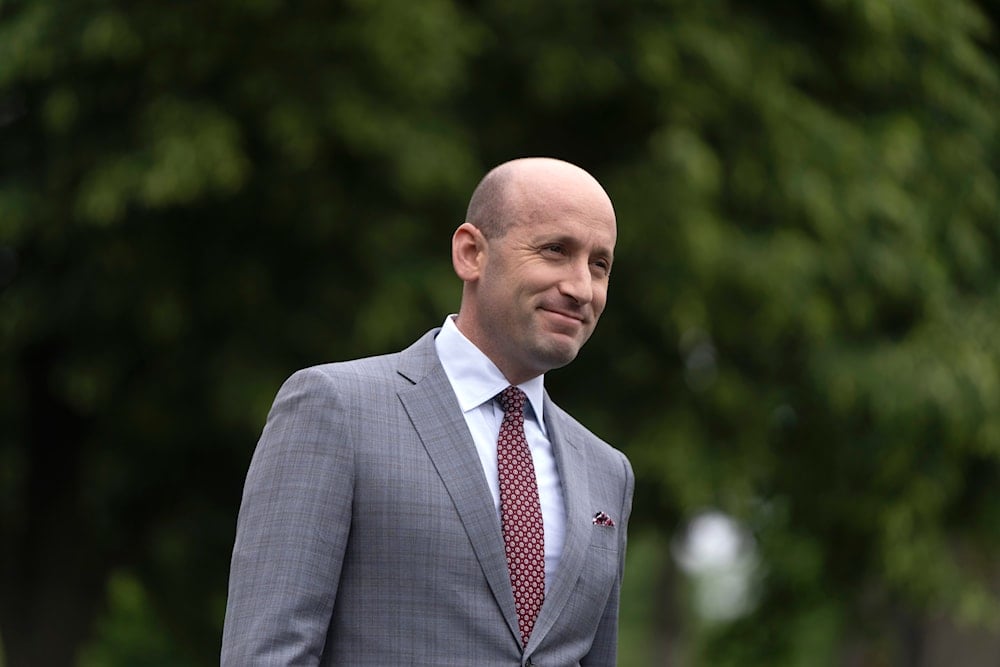Trump administration considers suspending habeas corpus
Stephen Miller says the Trump administration is considering suspending habeas corpus under the pretext of an "invasion," as courts push back against deportation attempts.
-

White House Deputy Chief of Staff Stephen Miller speaks to reporters outside the White House, on May 9, 2025, in Washington. (AP Photo/Mark Schiefelbein)
Stephen Miller, a senior White House advisor, stated on Friday that the Trump administration is actively considering the suspension of habeas corpus, the constitutional right to challenge unlawful detention.
Speaking to reporters at the White House, he said, "The constitution is clear, and that of course is the supreme law of the land, that the privilege of the writ of habeas corpus could be suspended in time of invasion. So that’s an option we’re actively looking at. A lot of it depends on whether the courts do the right thing or not."
Miller’s statement hinges on the Suspension Clause of the US Constitution, which reads, "The Privilege of the Writ of habeas corpus shall not be suspended, unless when in Cases of Rebellion or Invasion the public Safety may require it."
Read next: Trump’s secret goal; deport one million migrants: WP
The clause has historically been invoked only in extreme circumstances, such as during the Civil War by Abraham Lincoln, during anti-Ku Klux Klan efforts in 19th-century South Carolina, in the Philippines in 1905, and in Hawaii following the attack on Pearl Harbor.
Suspending habeas corpus would mark a significant escalation in the Trump administration’s hardline approach to immigration, and would undercut existing legal avenues for challenging deportation, a strategy heavily influenced by Miller’s immigration policies.
Historically reserved for grave crises, the suspension of habeas corpus underscores the extreme nature of Miller’s proposal and the administration’s readiness to bypass judicial oversight for mass deportations.
Deportation efforts under the Alien Enemies Act
The Trump administration has invoked the 18th-century Alien Enemies Act (AEA) to bypass legal protections, claiming a wartime "invasion" by immigrants, many of whom he accused of being members of the Venezuelan Tren de Aragua gang. However, federal judges across party lines have repeatedly rejected this rationale, asserting that the AEA’s use of "invasion" refers to military threats, not immigration.
On March 26, Judge Karen Henderson, appointed by Ronald Reagan and George W. Bush, concurred with Obama appointee Judge Patricia Millett, underscoring bipartisan judicial rejection of the administration’s interpretation of the Alien Enemies Act: "The government claims that the term ‘invasion’ as used in the AEA encompasses ‘the arrival somewhere of people or things who are not wanted there’. The text and its original meaning say otherwise. The theme that rings true is that an invasion is a military affair, not one of migration."
Legal and Judicial Pushback
As per Miller, legal challenges to the administration’s interpretation have been central to resisting deportations. Habeas corpus deportation cases have been filed by several individuals, including Mahmoud Khalil and Rümeysa Öztürk, who sought to contest their detention and removal.
Moreover, Judge Stephanie Gallagher, appointed by Trump, dismissed the invasion rationale on April 23, writing that government lawyers "have provided no evidence, or even any specific allegations," as to how an unaccompanied minor seeking asylum "poses a threat to public safety."
Georgetown law professor Steve Vladeck highlighted the constitutional misinterpretation in his newsletter: "Miller is being slippery about the actual text of the constitution."
He emphasized that the clause does not grant blanket power to suspend judicial review during any invasion, stating, "The emergency itself isn’t enough. Releasing someone like Rümeysa Öztürk from immigration detention poses no threat to public safety."
While federal courts have pushed back against the administration’s attempts to use the AEA and suspend habeas rights, Trump has publicly criticized judges who ruled against him and, in some instances, openly defied court orders. This trend reflects a broader attempt to consolidate executive authority over immigration, a core focus of the Trump administration immigration policy.

 4 Min Read
4 Min Read









